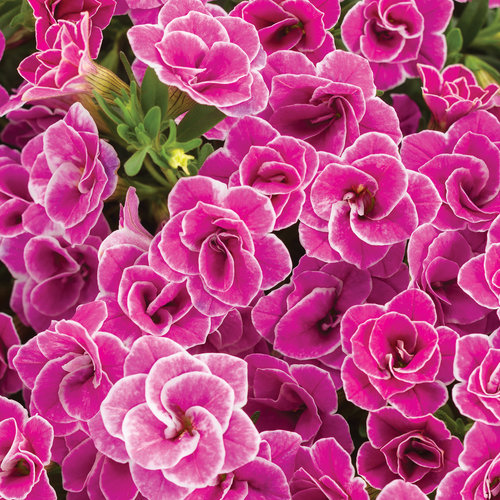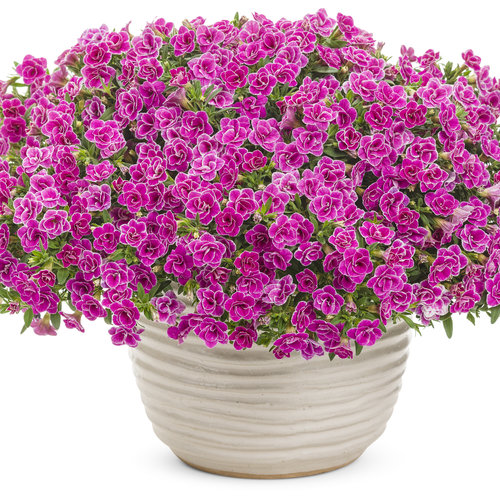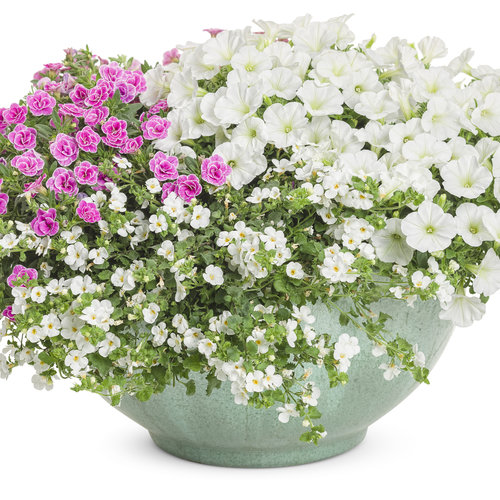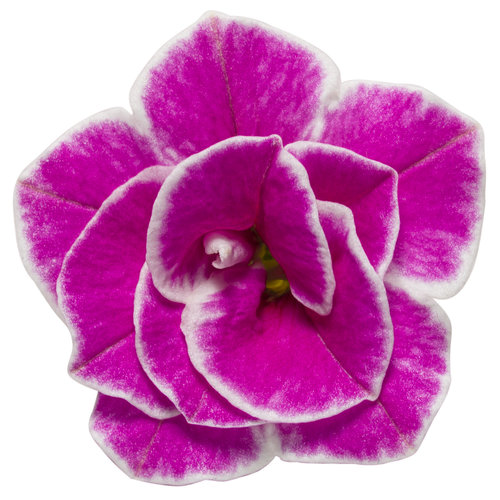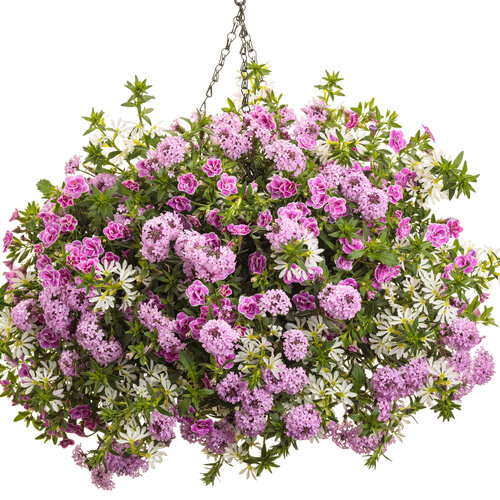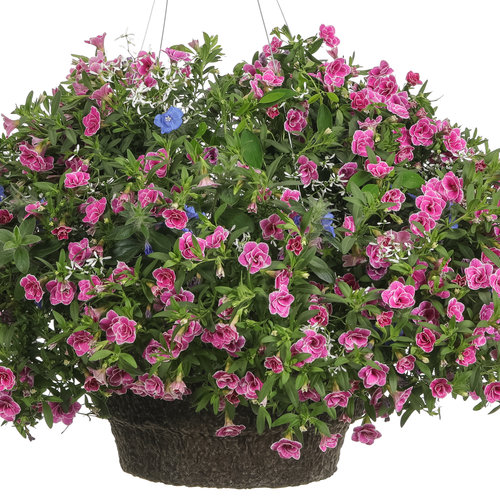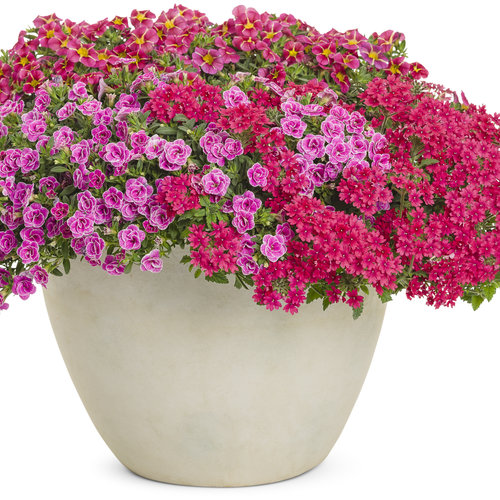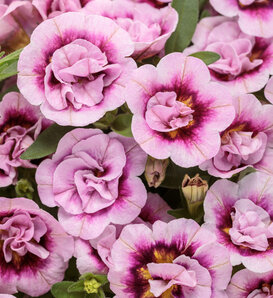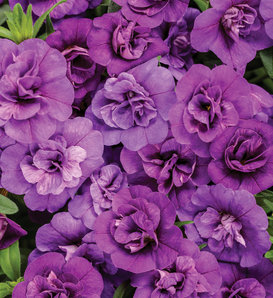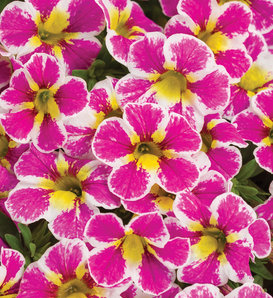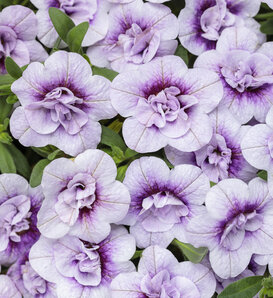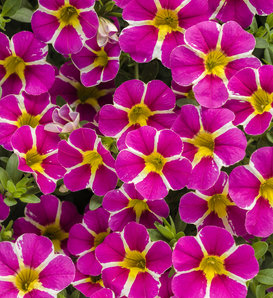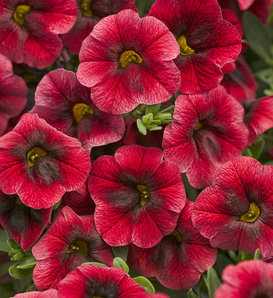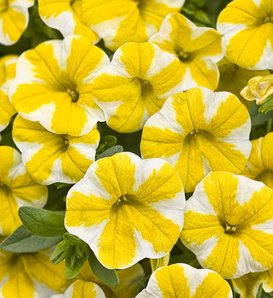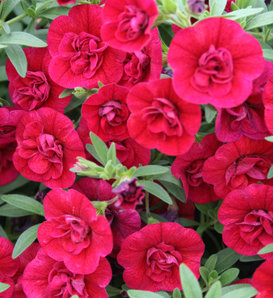I finally was able to find this Calibrachoa local to me, but wanted to review it immediately because there's an instant downside to this variety. The flowers are a beautiful pink with white edges, but like other Calibrachoa these fade into a purple color. Even though it doesn't bloom as profusely as others, to keep that clean pink color, you'd have to constantly dead head the aging flowers. This can definitely ruin the look someone's going for in a mixed planter or in a color themed garden.
Superbells® Doublette Love Swept™ Double Calibrachoa Calibrachoa hybrid
- Part Sun to Sun
- Spring
- Summer
- Fall
-
6 - 10 Inches8 - 12 Inches12 - 24 Inches15cm - 25cm20cm - 30cm30cm - 61cm
Features
Abundant, small double petunia-like flowers all season on cascading growth; low maintenance. The flowers are a gorgeous deep pink, with a fine white rim on each petal. The effect is pure heaven.
Award WinnerContinuous Bloom or RebloomerLong BloomingFall InterestHeat TolerantDeadheading Not NecessaryCharacteristics
Plant Type:AnnualHeight Category:ShortGarden Height:6 - 10 Inches 15cm - 25cmTrails Up To:16 Inches 41cmSpacing:8 - 12 Inches 20cm - 30cmSpread:12 - 24 Inches 30cm - 61cmFlower Colors:PinkFlower Colors:WhiteFlower Shade:Deep Pink edged in WhiteFoliage Colors:GreenFoliage Shade:GreenHabit:Mounding TrailingContainer Role:SpillerPlant Needs
Light Requirement:Part Sun to SunThe optimum amount of sun or shade each plant needs to thrive: Full Sun (6+ hours), Part Sun (4-6 hours), Full Shade (up to 4 hours).
Maintenance Category:EasyBloom Time:Planting To Hard FrostHardiness Zones:9a, 9b, 10a, 10b, 11a, 11bWater Category:AverageNeeds Good DrainageUses:ContainerUses Notes:Use in hanging baskets, patio planters and combination planters of all kinds.
Calibrachoa do not like to have constantly damp soil. They will do well in the ground only with good drainage. For most gardeners containers are the best use for Calibrachoa.
Maintenance Notes:When planting Calibrachoa I often give the plants a slight trim, using a sharp pair of scissors or pruning shears. While not a necessary step, it will increase branching and may help your plants look even fuller.
Calibrachoa are usually easiest to grow in containers. If the roots are kept too wet it can lead to root rot diseases. In containers, allow the top of the soil to dry before watering again. If your plant is wilting even though the soil is still damp you likely have a root rot problem.
Calibrachoa can be fantastic in-ground plants, but only if they are planted in well-drained soil. Raised beds would be a good choice for planting Calibrachoa in the landscape. In the ground they shouldn't need much additional water unless conditions are very dry. Proper watering is key to growing good Calibrachoa.
The plants are low-maintenance with no deadheading needed. They will do best if fertilized on a regular basis. Calibrachoa can be sensitive to both high and low pH. If your plants have been growing for a while and then begin to look a bit tired and not so good there are several things to try. If the foliage is yellow there are two possible causes. If you haven't been fertilizing regularly they could simply be hungry and in need of fertilizer. Feed them using a well-balanced (look for something with an n-p-k ratio near 24-12-17) water soluble fertilizer. If you have been fertilizing regularly with a well-balanced fertilizer and the foliage is still turning yellow, it is probably because the pH range in your soil has gotten a bit high or low. The most common impact of this is that Iron can no longer be taken up by the plant, even if it is available in the soil.
The common form of Iron used in fertilizer is sensitive to pH changes. If you think pH is your problem you can either try to lower (or raise) the pH or you can simply apply Chelated Iron, which is available at a wider pH range and should help your plants turn green again. You may also be able to find Iron in a foliar spray (which means you spray it on the foliage rather than applying it to the soil) which can also help your plant turn nice and green again. Stop by your favorite garden center and they should be able to help you choose a product to use. Or use our Proven Winners Water Soluble fertilizer, which has the chelated iron.
As the season goes on the plants can sometimes just start to look open and not as good. This can happen even if they are being watered and fertilized correctly. Fortunately this is very simple to fix. Grab a sharp pair of scissors or pruning shears and give the plants an all over trim. This will cause them to branch out more and should stimulate new growth and flowering, especially if you fertilize right after trimming them back. Just like your hair looks a lot better after a trim, your plants often will too. You will sacrifice flowers for a few days, but the plants should shortly come back flowering more than ever. I will usually give my Superbells a trim back in late July or early August. Should your plants have a few unruly stems that are longer than everything else or sticking our oddly, you can trim these stems back at any time. Calibrachoa are very forgiving when it comes to trimming.
An application of fertilizer or compost on garden beds and regular fertilization of plants in pots will help ensure the best possible performance.
Superbells® Doublette Love Swept™ Calibrachoa hybrid 'USCAL81302' USPP 30,804, Can 6,293, US Utility 7,786,342 -
5641312112Browse reviews from people who have grown this plant.
-
Brighton, 1 year ago
-
These didn't grow particularly full throughout the summer but they were in a partly shaded area which may have contributed to the lack of "lushness". However, it is now early November in Ontario Canada and they are one of the few flowers still blooming, despite our having had several nights with temperatures well below freezing. It is so nice to still have flowers around when many other annuals have already sucumbed to the cold.
Jan, Ontario, Canada, 3 years ago -
This might be my new favorite calibrachoa. The flowers are really pretty, like miniature roses. It started looking a little rough mid-summer so I trimmed it back and it grew like crazy. Tons of blooms and it's still flowering at the end of September. I'm definitely buying this one again.
Cherie Williams, Kansas, United States, 4 years ago -
This plant is a short-lived perennial in my zone (10a) and it has been phenomenal for me in a large mixed pot. I don’t know how it compares to other superbells, but it outperformed another generic calibrachoa (not from Proven Winners) I bought around the same time in both bloom power and longevity. The double blooms with the white edges are very striking. Love Swept got large enough to cascade out of the pot for about a foot of blooms, and was still blooming through the end of the year and into January in my frost free zone. I had heard calibrachoas can be finicky and didn’t have high hopes for this one, and am thrilled with how well it has done with just a bit of fertilizer, excellent drainage, and regular water.
Aileen, California, United States, 4 years ago -
This variety doesn’t produce quite as many flowers as some of the others, but I believe it makes up for that in the beauty of the flowers!! They look like tea roses. I had mine under the eaves of our back porch so it got mainly afternoon sun from 2 PM on and did very well. The one I had in full sun actually didn’t do as well. Will definitely purchase again!!
JF, South Dakota, United States, 6 years ago -
Really liked this one - love the picot-edged pink and white! The tag said they will not be as exuberant as other varieties of the million bells, so I put one in a planter in the middle of my outdoor table so I could enjoy it up close. got three pots of them for my mother's home and planted each with a PW Diamond Frost in the same container and they are still going strong in mid-August and boy is it hot here in Phila suburbs! I do water daily and have grabbed absently deadheaded at times while having a glass of wine and babysitting the Golden Retriever puppy - but they have not been high-maintenance. I did do a big cut back after 4th of July and they came back strong. Will get them next year also. They were hard to find - maybe because new? Glad I found them for me and my mother!
KAREN H SOTO, Pennsylvania, United States, 6 years ago -
Mine is in a container and gets partial sun. Actually the amount of sun varies throughout the day and it has done well.
Michelle Goad, Maryland, United States, 6 years ago
Award Year Award Plant Trial 2018 Top Performer University of Wisconsin 2018 Top 10 Consumer Preference University of Florida - Fort Lauderdale 2018 Top Performer Penn State University 2018 Top Performer University of Guelph 1 More Recipes- Broke My HeartRecipe
What you'll need:
-
1
-
1
-
1
-
- Blow Me a KissRecipe
What you'll need:
-
2
-
2
-
2
-
- Ophelia SongRecipe
What you'll need:
-
1
-
1
-
1
-
-



